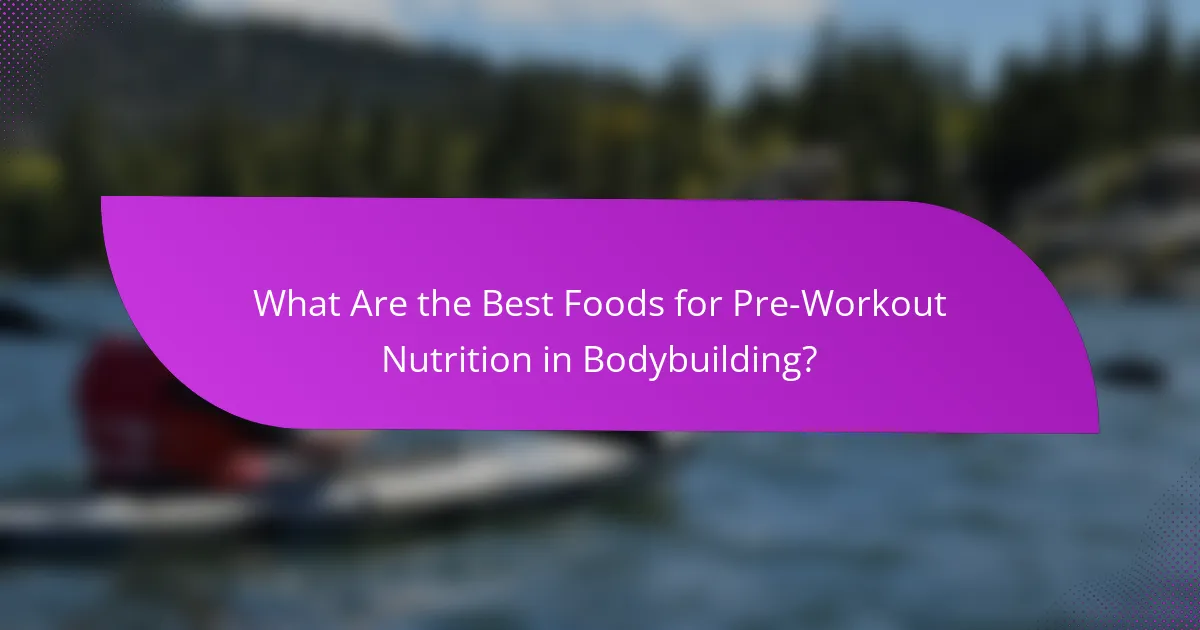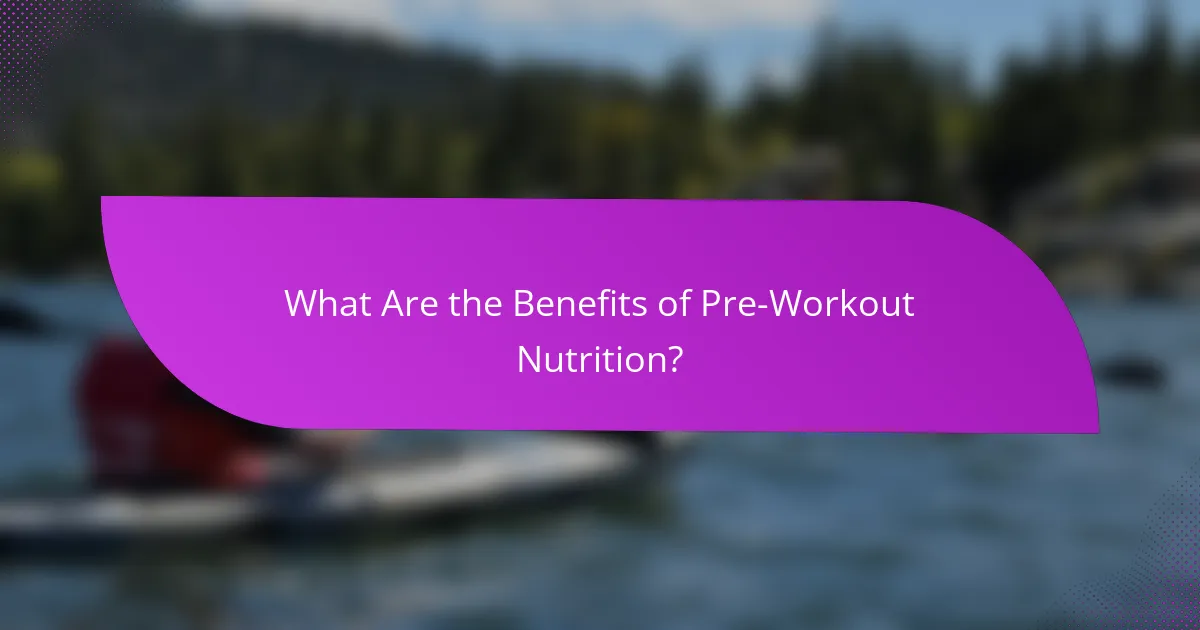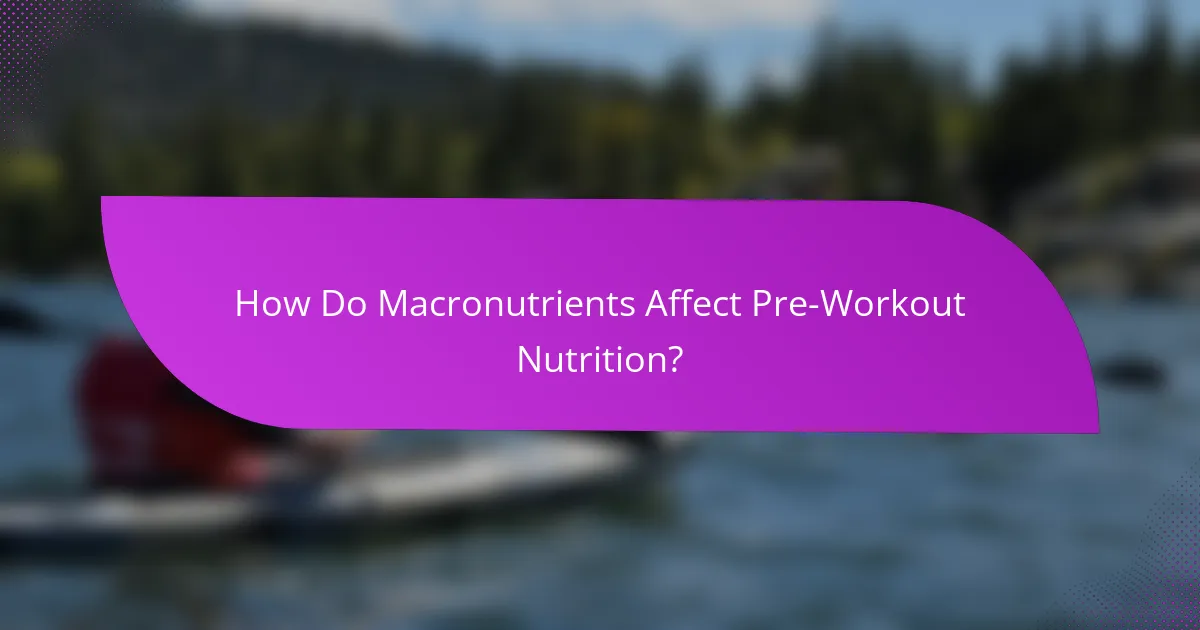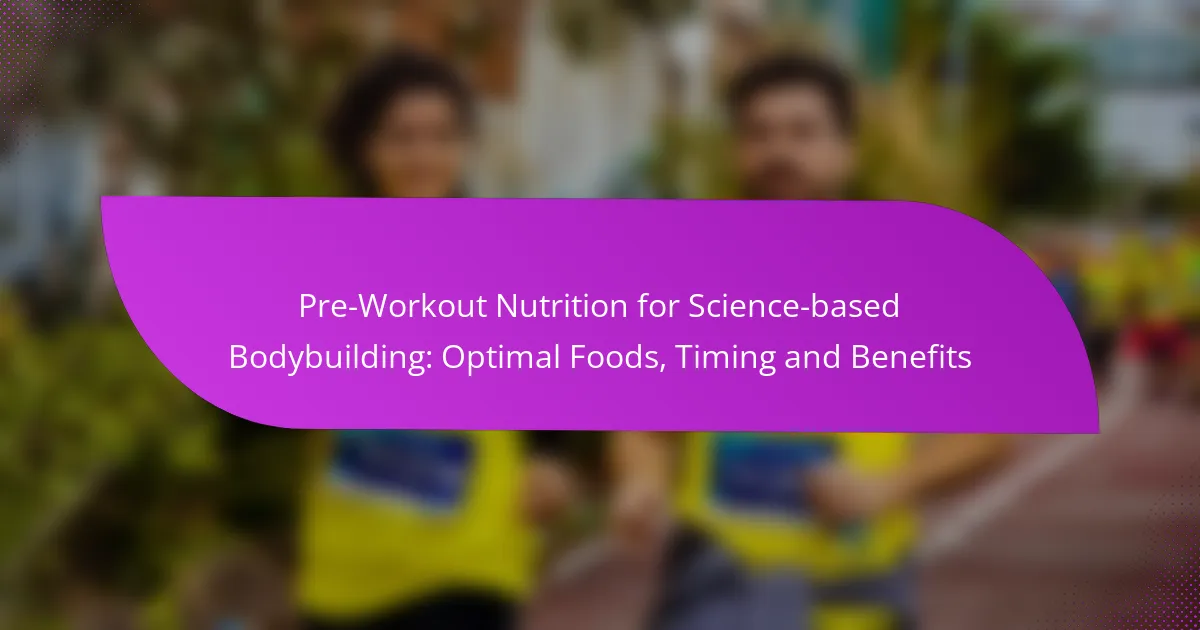Pre-workout nutrition plays a crucial role in bodybuilding by providing the energy and nutrients necessary for optimal performance. Consuming the right combination of complex carbohydrates, lean proteins, and healthy fats about 30 to 90 minutes before your workout can enhance energy levels, support muscle repair, and improve overall results. By prioritizing proper pre-workout nutrition, you can maximize your training effectiveness and recovery.

What Are the Best Foods for Pre-Workout Nutrition in Bodybuilding?
The best foods for pre-workout nutrition in bodybuilding include complex carbohydrates, lean proteins, healthy fats, and proper hydration sources. These components provide the necessary energy, support muscle repair, and enhance overall performance during workouts.
Complex carbohydrates
Complex carbohydrates are essential for fueling workouts, as they provide a steady release of energy. Foods like whole grains, oats, and sweet potatoes are excellent sources that can sustain energy levels during intense training sessions.
For optimal results, aim to consume complex carbs about 1-3 hours before your workout. This timing allows your body to digest and convert them into usable energy, preventing fatigue and enhancing performance.
Lean proteins
Lean proteins play a crucial role in muscle repair and growth, making them a vital part of pre-workout nutrition. Options such as chicken breast, turkey, fish, and plant-based proteins like lentils and chickpeas are great choices.
Consuming protein 30-90 minutes before exercising can help minimize muscle breakdown and promote recovery. Aiming for around 15-30 grams of protein can be effective for most individuals.
Healthy fats
Healthy fats can provide a long-lasting energy source, which is beneficial for extended workouts. Foods like avocados, nuts, and olive oil contain monounsaturated fats that support overall health and energy levels.
However, it’s best to consume fats in moderation before workouts, as they can slow digestion. Aim for a small serving about 1-2 hours before exercising to avoid any gastrointestinal discomfort.
Hydration sources
Staying hydrated is critical for optimal performance in bodybuilding. Water is the best choice for hydration, but electrolyte-rich drinks can be beneficial, especially during longer sessions or in hot conditions.
Drink water consistently throughout the day and consider consuming 500-750 ml about 2-3 hours before your workout to ensure proper hydration levels. This can help maintain endurance and prevent fatigue.
Examples of optimal meals
Here are some examples of optimal pre-workout meals that combine the key components:
- Oatmeal topped with banana and a scoop of protein powder.
- Grilled chicken with quinoa and steamed broccoli.
- Greek yogurt with mixed berries and a sprinkle of nuts.
- Whole grain toast with avocado and a poached egg.
These meals provide a balanced mix of carbohydrates, proteins, and healthy fats, ensuring you have the energy and nutrients needed for effective workouts.

When Should You Consume Pre-Workout Nutrition?
Pre-workout nutrition should ideally be consumed about 30 to 90 minutes before your workout. This timing allows your body to digest and absorb the nutrients, providing you with the energy and focus needed for optimal performance.
Timing recommendations
For most individuals, consuming a meal or snack 30 to 60 minutes prior to exercise is effective. This timeframe allows carbohydrates to convert into glucose, which fuels your workout. If you prefer a larger meal, aim for 90 minutes to two hours before exercising to ensure proper digestion.
Consider your workout intensity and duration when planning your pre-workout nutrition. For high-intensity sessions, a quick-digesting carbohydrate source, like a banana or a sports drink, may be beneficial. For longer workouts, a balanced meal with protein, fats, and carbs can sustain energy levels.
Impact of meal size
The size of your pre-workout meal significantly affects your performance. A small snack, such as a protein bar or yogurt, can provide a quick energy boost without causing discomfort. Conversely, a larger meal may lead to sluggishness if consumed too close to your workout.
As a general guideline, keep your pre-workout meal around 200 to 400 calories, depending on your body size and workout demands. Adjust the portion size based on how your body responds to different meal sizes during exercise.
Individual metabolism considerations
Each person’s metabolism can influence how they respond to pre-workout nutrition. Factors such as age, body composition, and fitness level can affect digestion and energy utilization. Some individuals may require more time to digest food, while others may thrive on a quick snack.
Experiment with different foods and timing to find what works best for you. Keep a journal of your workouts and pre-exercise meals to identify patterns in energy levels and performance. This personalized approach will help you optimize your pre-workout nutrition strategy.

What Are the Benefits of Pre-Workout Nutrition?
Pre-workout nutrition significantly enhances energy, performance, and recovery during bodybuilding. Consuming the right foods before exercise can lead to better workouts and improved overall results.
Enhanced energy levels
Pre-workout nutrition provides the necessary fuel for energy during intense training sessions. Foods rich in carbohydrates, such as oats or bananas, can elevate glycogen stores, ensuring sustained energy throughout the workout.
Aim for a meal or snack containing 30-60 grams of carbohydrates about 30-60 minutes before exercising. This timing helps maximize energy availability without causing digestive discomfort.
Improved performance
Proper nutrition before workouts can lead to enhanced performance, allowing for greater strength and endurance. Consuming protein alongside carbohydrates can support muscle function and prevent fatigue.
Consider a pre-workout meal with a ratio of 3:1 carbohydrates to protein, such as a smoothie with fruit and protein powder. This combination can help you lift heavier and train longer, ultimately contributing to better muscle gains.
Faster recovery
Eating before workouts not only boosts performance but also aids in recovery post-exercise. Nutrients consumed beforehand can help reduce muscle soreness and speed up the replenishment of glycogen stores.
Incorporating a mix of carbohydrates and protein after your workout can further enhance recovery. Aiming for a post-workout intake of 20-40 grams of protein and 40-80 grams of carbohydrates within 30 minutes can optimize recovery and prepare you for your next session.

How Do Macronutrients Affect Pre-Workout Nutrition?
Macronutrients play a crucial role in pre-workout nutrition by providing the energy and building blocks necessary for optimal performance. Understanding how carbohydrates, proteins, and fats contribute to your workout can help you make informed choices about your pre-exercise meals.
Role of carbohydrates
Carbohydrates are the primary source of energy for high-intensity workouts. They are stored in the muscles and liver as glycogen, which is readily available during exercise. Consuming carbohydrates before a workout can enhance endurance and delay fatigue.
Aim for a pre-workout meal that includes complex carbohydrates such as whole grains, fruits, or starchy vegetables. Ideally, consume this meal about 1-3 hours before exercising to allow for proper digestion and energy availability.
Importance of proteins
Proteins are essential for muscle repair and growth, making them a vital component of pre-workout nutrition. Consuming protein before exercise can help reduce muscle breakdown and support recovery after your workout.
Incorporate lean protein sources like chicken, fish, eggs, or plant-based options such as legumes and tofu in your pre-workout meal. Aiming for about 15-30 grams of protein can provide the necessary amino acids for muscle support.
Effects of fats
Fats serve as a secondary energy source, especially during longer, lower-intensity workouts. While they are important for overall health, consuming high amounts of fat immediately before a workout may lead to digestive discomfort and sluggishness.
Focus on healthy fats, such as avocados, nuts, or olive oil, but limit their intake in pre-workout meals. A small portion, around 5-10 grams, can be beneficial, especially if consumed a few hours before exercising to allow for digestion.

What Are Common Mistakes in Pre-Workout Nutrition?
Common mistakes in pre-workout nutrition can hinder performance and recovery. Key issues include skipping meals and making improper food choices, both of which can lead to decreased energy levels and suboptimal workout results.
Skipping meals
Skipping meals before a workout can lead to low energy levels, making it difficult to perform at your best. Ideally, you should consume a balanced meal 2-3 hours prior to exercising, which includes carbohydrates, protein, and healthy fats.
If you are short on time, consider a smaller snack 30-60 minutes before your workout. This could include a banana with peanut butter or a protein shake, which can provide a quick energy boost without feeling heavy.
Improper food choices
Choosing the wrong foods before a workout can negatively impact your performance. Foods high in sugar or fat may lead to a quick energy spike followed by a crash, leaving you fatigued during your session.
Focus on complex carbohydrates like oats or whole grain bread, combined with lean protein sources such as chicken or Greek yogurt. These options provide sustained energy and support muscle function, enhancing your overall workout experience.



